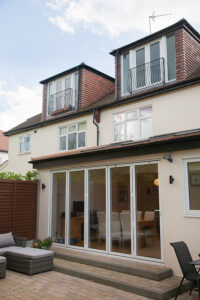Types of Loft Conversion
Dormer Loft Conversions
Dormer loft conversions are highly versatile and suitable for various property types, including terraced, semi-detached, and detached homes.
Unlock Your Loft’s Potential: Everything You Need to Know About Dormer Loft Conversions

What is a Dormer Loft Conversion?
A Dormer Loft Conversion is a popular method of extending your home by adding a vertical extension to your roof.
The dormer creates additional headroom and usable floor space by building outwards from the existing roof slope, making the loft area more functional and comfortable. This type of conversion typically includes windows, which allow natural light to flood the space, transforming it into a bright, inviting living area.
Whether you’re adding a bedroom, home office, or playroom, a dormer can unlock the full potential of your attic.
What Are the Different Types of Dormers?
Dormer loft conversions come in various styles to suit your home’s architecture and your personal preferences. Here are the most common types of dormers:
Flat Roof Dormer
The flat roof dormer features a box-like structure with a flat roof, maximising internal space. It’s a practical option for homeowners looking for functionality and additional headroom.
Pitched Roof Dormer
A pitched roof dormer has sloping sides that blend with the existing roofline, offering a more traditional and aesthetically pleasing design. This option works well for homes with period or cottage-style architecture, or those in a Conservation area.
L-Shaped Dormer
An L-shaped dormer is an excellent choice for properties with an existing outrigger, as it combines two dormers at right angles to maximise space. This versatile design offers various layout options, such as two bedrooms and a bathroom or a spacious master bedroom with a study and en-suite. The possibilities are endless, making it a highly flexible solution for expanding your living space.
Mansard Dormer
A Mansard Dormer features a flat roof with a steeply sloped front. This design often spans the entire width of the roof, making it an excellent choice for properties in urban areas, such as terraces, where maximising loft space is essential. Mansard dormers are commonly seen in period homes and add a sophisticated, classic look to the property.
How do I decide what Dormer type will work for my property?
Choosing the right dormer type for your property depends on several factors, including your home’s architectural style, your budget, and how you plan to use the space.
For example, a flat roof dormer is a practical option for maximising internal space, while a pitched roof dormer offers a more traditional aesthetic that complements period homes.
If you need a large, versatile area, an L-shaped dormer might be ideal, particularly for properties with outriggers. Urban homeowners looking for maximum space may opt for Mansard dormers, which blend well with older, characterful properties.
We can help you evaluate your options based on structural feasibility, planning permissions, and your personal preferences, ensuring the dormer you choose enhances both your home’s functionality and its appearance.
Benefits of Adding a Dormer Loft Conversion
Adding a dormer loft conversion to your home offers a wide range of advantages, making it an appealing choice for homeowners:
- Increased Space: Dormers create additional headroom and floor space, making your loft more practical and comfortable for everyday use.
- Natural Light: Dormer windows allow more natural light to enter the loft, transforming it into a bright and inviting area.
- Enhanced Aesthetics: Depending on the style chosen, dormers can add character and charm to your home’s exterior, enhancing its curb appeal.
- Versatile Living Areas: A dormer loft conversion can be used for various purposes, including bedrooms, offices, playrooms, or even an extra bathroom, making it a versatile addition to your home.
- Increased Property Value: By adding an extra, functional room to your home, a dormer loft conversion can significantly boost your property’s market value, making it a smart investment.
- Cost-Effective Expansion: Compared to moving house or building a full-scale extension, a dormer loft conversion is a more affordable way to gain additional living space.
- Adaptable to Most Roof Types: Dormers are suitable for many types of properties and roof structures, offering flexibility in design and construction.
Conclusion
A dormer loft conversion is an excellent way to transform your unused attic into a practical and stylish living area. With a variety of styles to choose from, dormers can be tailored to your home’s architecture and your specific needs.
Whether you’re looking to increase space, improve natural light, or boost your property value, a dormer loft conversion offers a cost-effective and versatile solution that enhances both your home’s functionality and appearance.
Why choose us to design and install your loft conversion?
With more than 28 years of practical experience, Marken Lofts specialise in delivering outstanding loft conversions. We take pride in our work and always strive to ensure our customers are truly happy and feel they have received exceptional value for their investment.
Our Commitment to Excellence
- Uncompromising Quality: Every project we undertake reflects our dedication to superior craftsmanship.
- Competitive Pricing: Offering exceptional value without compromising on excellence.
- Fully Insured: For your peace of mind, our team is fully insured up to £2 million.
- Immaculate Cleanliness: We maintain the highest standards of tidiness on every job.
- Transparent Pricing: Clear, upfront costs with no hidden surprises—know exactly what to expect.
- 10-Year Work Guarantee: Confidence and peace of mind with every project.
- End-to-End Project Management: From concept to completion, we handle every detail for a seamless loft conversion experience.
Our 10-Year Guarantee reflects the confidence we have in our skilled team to deliver outstanding results every time.
Areas we work in
We deliver exceptional loft conversions across North London, East London, and Central London. Get in touch if you would like to confirm we cover your area, or click on the map for more information.
For advice on a loft conversion or for a free survey call 0800 111 4883 or enquire online:
"*" indicates required fields
FAQ
How long will the consultation and survey take?
Generally, we allocate approximately 1-2 hours for the consultation and survey process, but its often is no longer than 40 minutes. For larger or more intricate projects, it may take slightly longer to ensure we capture all necessary information accurately. Rest assured, our goal is to provide a comprehensive evaluation while respecting your time constraints. If time is precious and you just want a price for the works, If you fill in our instant quote form, this will eradicate the need for an initial survey.
Do I need planning permission for a loft conversion?
Whether you’ll need planning permission or if your project falls under permitted development largely depends on various factors such as the type of property you own, its location, and the specific regulations set by your local planning authority. Typically, many loft conversions in London fall under permitted development rights, meaning you can carry out the conversion without the need for planning permission as long as certain criteria are met. However, it’s crucial to consult with a professional architect or a loft conversion specialist to assess your individual circumstances. Factors such as the size and shape of your loft, the proposed alterations, and any previous extensions or conversions already carried out on your property can affect whether your project qualifies for permitted development or requires planning permission.
How much does a loft conversion cost?
Loft conversion costs vary depending on factors such as the size and complexity of the project, the materials used. On average, a basic loft conversion can cost between £20,000 to £55,000, but this can increase significantly for larger or more complex projects.
How long does it take to complete a loft conversion?
The duration of a loft conversion depends on factors such as the size of the loft, the complexity of the design, and any unforeseen issues that may arise during construction. On average, we complete a loft conversion 6 weeks or less.
Will a loft conversion add value to my property?
Yes, a well-executed loft conversion can significantly increase the value of your London property. It not only provides additional living space but also enhances the overall appeal and functionality of your home, making it more attractive to potential buyers. What’s more, the enhanced value often exceeds the initial investment made in the loft conversion.
What type of loft conversion is best suited for my home?
The most suitable type of loft conversion for your London home depends on factors such as the existing roof structure, available space, and your specific requirements. Common types of loft conversions include dormer, Velux, hip-to-gable, L-Shape and mansard conversions. Contact us and we shall help determine the best option for your property.
Are there any building regulations or safety standards I need to adhere to when converting my loft in London?
Converting your loft requires strict adherence to building regulations and safety standards to guarantee structural integrity and compliance with fire safety regulations. It’s important to note that adding another storey to your home may necessitate upgrades to existing doors to meet fire safety requirements. As regulations are subject to change, partnering with a trusted company that emphasizes safety and compliance is paramount to ensure your project meets all necessary standards.
Do I need to inform my neighbors or obtain their consent before proceeding with a loft conversion?
Before commencing your loft conversion project, it’s important to consider whether any of your external walls are shared with a neighbor. In such cases, you’ll likely need to establish a party wall agreement. This legal agreement outlines the rights and responsibilities of both parties regarding construction work that impacts a shared wall or boundary. While this process can sometimes be straightforward, involving the signing of a party wall agreement form, your neighbor may opt to consult with a qualified party wall surveyor, which may incur additional costs on your part. It’s advisable to discuss this matter with your neighbor and seek professional advice to ensure a smooth process.

